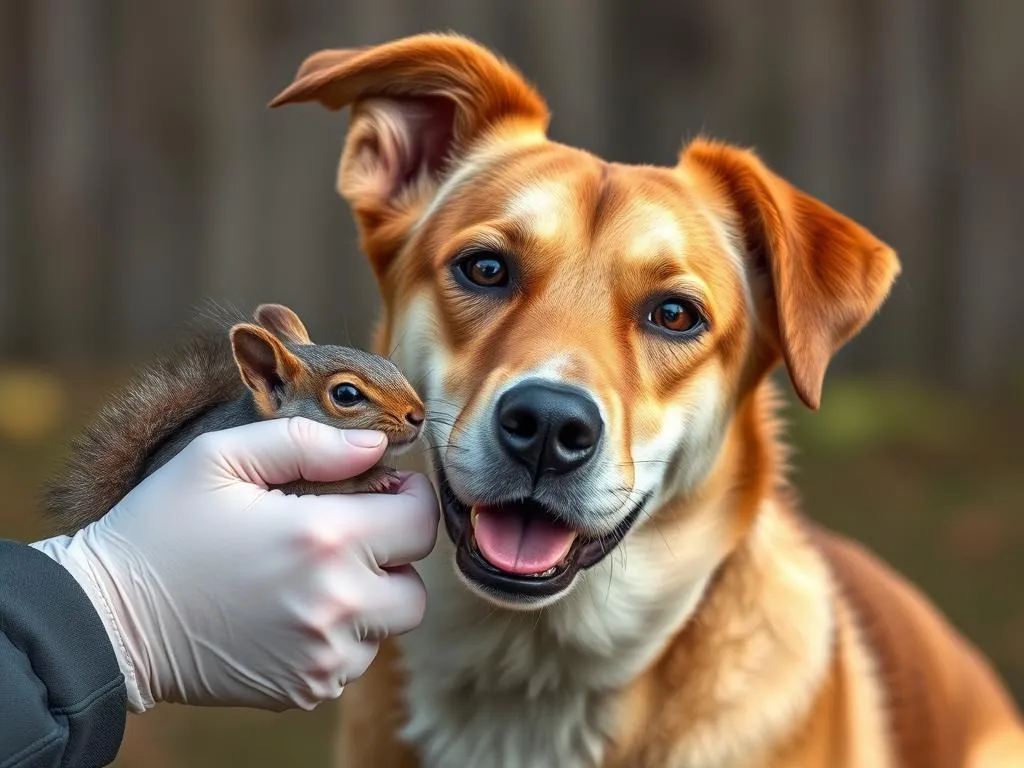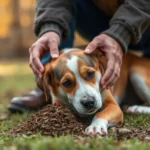
Introduction
It’s a common scenario for dog owners: you’re out for a walk, and your dog spots a squirrel. In an instant, they’re off, and before you know it, they’ve caught it. If your dog has eaten a squirrel, you’re likely feeling a whirlwind of emotions—concern, confusion, and maybe even a bit of panic. Understanding the potential risks associated with this situation is crucial for your dog’s health.
This article aims to provide comprehensive insights and guidance for dog owners who find themselves in this scenario. We will explore why dogs chase and eat squirrels, what immediate actions to take, and the potential health risks involved. Additionally, we’ll cover veterinary treatments, long-term implications, and address frequently asked questions regarding this topic.
Common Reasons Dogs Chase and Eat Squirrels
Instinctual Behavior
Dogs are descendants of wolves, and chasing small animals is part of their instinctual behavior. Many breeds possess strong hunting instincts, especially terriers and hounds, making them more likely to pursue and potentially catch small wildlife like squirrels. This behavior is deeply ingrained and can sometimes override training or commands.
Curiosity
Dogs are naturally curious creatures. Their sense of smell and sight drives them to explore their surroundings, often leading to interactions with wildlife. If your dog has been exposed to squirrels in the past, they may have developed a fascination that compels them to chase and investigate these creatures further.
Boredom or Lack of Stimulation
A lack of physical and mental stimulation can lead dogs to seek out alternative activities, which may include chasing after small animals. If your dog is not getting enough exercise or playtime, they might turn to wildlife as a source of entertainment. Regular walks, play sessions, and interactive toys can help mitigate this behavior.
What to Do If Your Dog Eats a Squirrel
Immediate Steps to Take
If your dog has just eaten a squirrel, the first step is to assess the situation. Look for any signs of distress, such as excessive drooling, vomiting, or unusual behavior. It’s also essential to check if there are any remnants of the squirrel left behind, as these could pose additional health risks.
When to Call the Vet
If your dog exhibits any concerning symptoms after eating a squirrel, it’s time to consult with your veterinarian. Some signs that indicate a veterinary visit is necessary include:
- Vomiting or diarrhea: These can be early signs of gastrointestinal distress.
- Lethargy or unusual behavior: If your dog seems unusually tired or disoriented, it could indicate a problem.
- Difficulty breathing: This is a serious sign and requires immediate veterinary attention.
Information to Provide to the Vet
When you call or visit the vet, be prepared to share key details about the incident. Essential information includes:
- The size of the squirrel your dog ate.
- Any observed symptoms following the incident.
- The time of the incident: This can help the vet assess the risk of parasites or infections based on how long it’s been since ingestion.
Potential Health Risks of Eating a Squirrel
Parasites and Infections
Squirrels can carry several parasites that could pose health risks to dogs. Common parasites include Giardia and roundworms, which can be transmitted through ingestion. Symptoms of parasitic infections may include diarrhea, vomiting, and weight loss. If your dog shows any of these symptoms after eating a squirrel, contact your veterinarian for diagnosis and treatment.
Bacterial Infections
The risk of bacterial infections is another concern when a dog eats a squirrel. Squirrels may carry bacteria such as leptospirosis, which can lead to severe health issues. Symptoms of bacterial infections can include fever, vomiting, and lethargy. If you suspect your dog may have ingested harmful bacteria, seek veterinary care promptly.
Choking Hazards and Internal Injuries
Eating a squirrel can also pose choking hazards or lead to internal injuries. Bones and other hard materials can become lodged in your dog’s throat or digestive tract. Signs of choking or internal injury may include coughing, gagging, or a distended abdomen. If you observe any of these symptoms, immediate veterinary attention is necessary.
Veterinary Treatments and Recommendations
Diagnostic Procedures
If you take your dog to the vet after they’ve eaten a squirrel, the veterinarian may perform several diagnostic tests. These can include fecal tests to check for parasites, blood work to assess overall health, and diagnostic imaging, such as X-rays, to identify any internal injuries. Early diagnosis is crucial in addressing any health concerns effectively.
Treatment Options
Treatment options will vary depending on the symptoms your dog displays and the results of diagnostic tests. Common treatments may include:
- Deworming: If parasites are detected, your veterinarian may prescribe deworming medication.
- Antibiotics: For bacterial infections, antibiotics may be necessary to clear the illness.
- Home care tips: If your dog is recovering at home, ensure they stay hydrated and monitor them for any new symptoms.
Preventative Measures
To reduce the risk of similar incidents occurring in the future, consider the following preventative measures:
- Vaccinations: Ensure your dog is up to date on vaccinations to protect against diseases.
- Preventive medications: Discuss with your vet the option of medications that can prevent parasites.
- Training tips: Reinforce training to discourage chasing wildlife. Using commands like “leave it” can help keep your dog focused on you rather than squirrels.
Long-term Implications
Behavioral Changes
After the experience of eating a squirrel, your dog may exhibit behavioral changes toward wildlife. They might become more cautious or, conversely, more aggressive in pursuit. It’s essential to reinforce training and obedience to help your dog navigate their instincts safely.
Ongoing Health Monitoring
Following the incident, regular follow-ups with your veterinarian are recommended. Monitoring your dog’s health is crucial for catching any long-term effects early. Watch for signs of gastrointestinal distress or changes in behavior, and do not hesitate to reach out to your vet if you notice anything concerning.
FAQs About Dogs Eating Squirrels
Is it safe for a dog to eat a squirrel?
Generally, it is not safe for a dog to eat a squirrel due to the potential health risks, including parasites and bacterial infections. If your dog eats a squirrel, it’s essential to monitor them closely and consult your veterinarian if any symptoms arise.
What should I feed my dog after eating a squirrel?
After an incident, it’s wise to provide your dog with a bland diet to help their digestive system recover. Foods like plain boiled chicken and rice can be gentle on their stomach. Always consult your vet for specific dietary recommendations based on your dog’s health status.
Can dogs get rabies from eating a squirrel?
Rabies transmission primarily occurs through bites or scratches from an infected animal. While it is theoretically possible for a dog to contract rabies from eating a squirrel, it’s highly unlikely. However, if you suspect the squirrel may have been rabid, consult your vet immediately for further advice and potential rabies vaccination.
Conclusion
Navigating the concern of a dog ate a squirrel vet answer requires a proactive approach. Understanding the reasons behind this behavior, knowing the immediate steps to take, and recognizing the potential health risks are vital for every dog owner. Open communication with your veterinarian can help ensure your dog remains healthy and happy.
By reinforcing training and providing adequate mental and physical stimulation, you can help minimize the chances of your dog chasing and eating wildlife in the future. Always remain vigilant and prepared for any situations that may arise, and prioritize your dog’s well-being above all.









